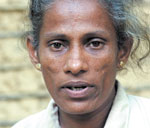| Plus |
|
|||
| THE
UNSEEN TRAGEDIES
It was a chance meeting in our search for tsunami orphans, being looked after by relatives. When we stop at a small brick house to ask for directions, a gaunt woman with a few soap suds on her hands runs up to the van and asks us whether no one mentioned her family. The woman is 42-year-old Naidu Hamuge Leelawathi and her tale is as pathetic or more so than the others affected by the tsunami because she and her family of three have fallen through the safety net, however small, provided by the state and are dependent on the handouts of non-governmental organizations. She does not live by the sea and her home was not damaged by the tsunami. She lives inland in Nelsonpura, Kalupe off Hikkaduwa. But she and her children are as much victims of the tsunami as any other whose life has been changed forever by the monstrous waves that engulfed some coastal areas of the island on December 26, 2004. Her husband died in the tsunami while he was at “work” off Seenigama, for his livelihood depended on breaking the corals for the mudalalis in the area. That day he left home and never returned. The double blow came after the tsunami because she too earned a few rupees from a coral based industry – she worked at a hunu poranuwa near the coast. The kilns, where the coral was fired to get chunam, have now closed, according to this mother of three teenage children with varying needs. With the tsunami she not only lost her husband but also her livelihood leaving her destitute. Luckily for her, the village has been under the wing of the German NGO, Osthoisetein, which has built houses for these men, women and children living in abject poverty. “We have a roof over our heads, otherwise we would have been in serious trouble,” she explains, taking a few minutes off her heavy workload to chat with us. In her garden by the well lies a heap of soiled clothes, resembling more a small mountain, adjacent to a couple of dirty enamel saucepans. To our gentle question what they had for breakfast she mutely shakes her head. When we ask what this lonely little family will have for lunch, the tears flow as she turns away her head. As the New Year dawns bringing with it hope for millions of people across the country, Leelawathi faces the future with despair. The worries are numerous: “How will I feed my Nishanthi, 17, Amil, 15, and Chamil, 13? How will I meet their educational needs, including clothes, books and tuition fees?” To the counter query, why she cannot work elsewhere, she laments that the only work in the area is crushing cinnamon and for that she has to go to different estates some distance away. She cannot be away from home for the night because she has a young daughter to look after. “I cannot leave the children alone, especially the girl,” she says, adding, “even the boys.” The
day we met Leelawathi, her daughter had gone for tuition, her middle
son was at home and the youngest son was playing with the village
boys in the temple garden just up the road. “Thotagamuwe iskole
vinasha vuna. Den pansele iskoleta yanne,” she says, explaining
that even the children’s school was destroyed and in 2005
they had to go to the temple for their lessons.” They have the tsunami card through which they get Rs. 200 per week per person and dry rations worth Rs. 175 per week per person. “The Lions’ Club is helping us by providing Rs. 3,000 per month for two of the children. You know how costly things are and my main aim is to educate my children so that they will not be in the same situation that we have been,” Leelawathi says. “My only wish for the New Year and for the other years to come is that I will be able to educate my children,” is the desperate plea of a valiant widow who is battling all odds to keep her children from starving and making all efforts to educate them. |
||||
Copyright © 2001 Wijeya Newspapers
Ltd. All rights reserved. |
